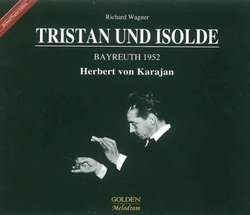| All Artists: Wagner, Vinay, Modl, Hotter, Unger, Karajan Title: Tristan & Isaolde Bayreuth 1952 Members Wishing: 0 Total Copies: 0 Label: Melodram Release Date: 4/30/2002 Genre: Classical Style: Opera & Classical Vocal Number of Discs: 4 SwapaCD Credits: 4 UPC: 608974110543 |
Search - Wagner, Vinay, Modl :: Tristan & Isaolde Bayreuth 1952
CD Details |
CD ReviewsUnsurpassable bliss. Plaza Marcelino | Caracas Venezuela | 08/26/2008 (5 out of 5 stars) "Karajan visited Bayreuth on a couple of years in the very early fifties, just as the Festival reopened after the war, performing this Tristan and a Ring cycle before leaving for good on account of his differences with the Wagner brothers, Wieland and Wolfgang. On account of this Orfeo album, it was utterly their loss for this is a Tristan for the ages and at the time no other conductor might have been better equipped to present these works as he was. The recording has been available on and off for the past 5 decades, mostly on pirate labels and unauthorised releases, but one of the virtues of this Orfeo release is that they gained access to the original master tape in the posession of Bavarian Radio, which frees these discs of a good many spurious "enhancements" suffered through the years. It must be said that the Bavarian Radio effort in this summer evening of 1952 is not a particularly remarkable one, the voices over-prominent and the orchestra recorded rather distantly. The results of restrictions on the part of producer Wieland Wagner or just an indifferent technical approach of the engineers? Who nows now, and in the end who cares, for this is probably one of the most beautiful and attractive performances of this work ever put to tape. Had it been better recorded by the Bavarian Radio engineers it might well be a reference recording, but its sound limitations of course rule it out as a sole example in a collection, yet it absolutely deserves to be heard, especially now that the master tape has been made available to Orfeo and the (discreet) clean-up work done on it (and explained in the accompanying booklet) sanctioned by Wolfgang Wagner.
Mödl sang here the Isolde of her life, giving all out and expressing the myriad emotions her character goes through, from the rage and frustrations of Act 1 to her final release that closes the work. She could be a problemmatic singer, but on this evening she was in particularly good form. Vinay was THE Tristan of his generation, a strong baritonal voice who, in spite of Karajan's reputed impatience with him, produced a characterisation that in subtlety and range of emotions equalled Mödl's, not to mention his sheer vocal power and reserves that last comfortably until his very last bars in Act 3. To have Hans Hotter as Kurwenal and Ludwig Weber as Marke is a luxury that perhaps only Bayreuth could get away with fifty-six years ago. Karajan no doubt relished conducting this work. His command of tension throughout the whole evening is remarkable, as is his control over the succesive waves of sound he bathed his singers with when required, varying his tempi and dynamics (as can be ascertained by the rather dim way the orchestra was picked up by the microphone) masterfully. A seasoned opera conductor that he was, he never let his singers down. Act 2's love duet will tighten your throat in no way other performance may aspire to, and the indulgence and self consciousness that plagued much of Karajan's latter work (as is the case with his sugary stereo, studio recording for EMI, featuring Jon Vickers in the title role) is nowhere to be seen here, where the romanticism imbedded in the score is magnificently exposed and allowed to wash the performance unabatted without the sentimentality and even vulgarity he could occasionally veer into in his later years. So, allowing for its technical shortcomings (which in view of the performance's importance do not add up in the the end to such a big deal), this is a Tristan und Isolde that will not let you down. It doesn't matter how many versions you may have of this opera in your collections, be they LP's, CD's or video, any lover of the work will want to have this one." |

